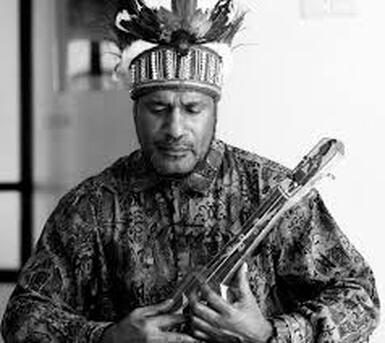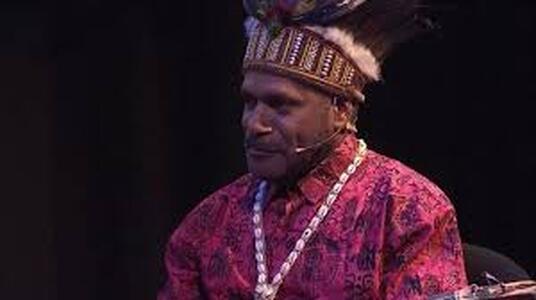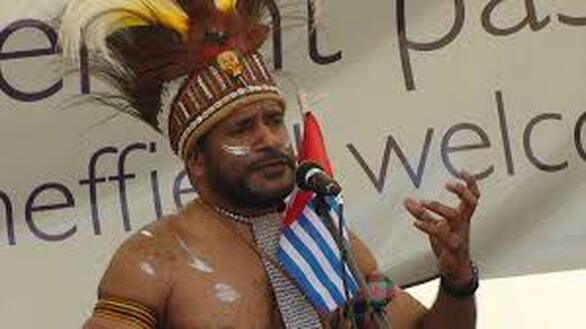|
In 1974, on the island of West Papua, in the Pyramid Village of the Bailem Valley, a boy was born who would become the man to lead his people in a fight against Indonesian oppression. Benny Wenda is a member of the indigenous Lani people of West Papua, as a child he enjoyed gardening and living a peaceful life with his mother. The lands of the Lani were invaded by the Indonesian military in 1977; they constantly terrorized, beat, and raped the Lani people to keep them under control. The Lani women were forced to become servants to the soldiers bringing them food and catering to their individual needs. The vile treatment of the Lani people led to an uprising against the Indonesian military. 15,000 Lani people fought against the Indonesian military to regain their freedom. The military countered their attack by dropping bombs on the Lani villages, killing many people and injuring many more. Benny was one of the children who were injured by the bombings. His leg was severely injured and he did not receive treatment because of the oppressive conditions. The Lani people that survived were forced into the jungles to escape persecution. The surviving Lani living in the jungles were helpless against the attacks of the Indonesian military. Once, Benny and his family were traveling through the jungle when they were attacked by military personnel, the men ripped a baby from its mother’s arms breaking its back as they threw it to the ground, they then proceeded to rape Benny’s aunt forcing him to watch. The living conditions in the jungle were bad and forced the Lani people to surrender to Indonesian rule. Benny’s family remained in the jungle a bit longer but was forced to surrender after his grandmother died. A decision was made by his grandfather and other adults to surrender to the Indonesians to ensure the survival of the children. During their surrender, the Lani had to present themselves holding the Indonesian flag, pledge their allegiance to Indonesia, and vow to live under Indonesian law. After his family surrendered, Benny was placed in an Indonesian school and immediately indoctrinated to view the Indonesian as superior and his people as inferior. He was only taught about the history of Indonesia, forced to eat Indonesian food, forced to dress and think like an Indonesian, all while being terrorized by Indonesian youth. As an inquisitive child and a victim of constant terror, he would ask his mother why the Indonesian people treated them so bad, she would never answer his questions, she would just say he will learn one day. Benny went on to attend the University of Jayapura earning a degree in sociology and politics, an education he would use to help his people. As a natural leader, Benny began to organize the Papuan people and students to start talking, educating and strategizing to take a stand against the oppression they were experiencing. One of the main things Benny wanted for his people was for them to know who they truly were and where they come from. As mentioned earlier, the Indonesian education they received only taught them that they were savages. Benny was not satisfied with the lack of information about his people, so he began to search vigorously for any information he could find. Every resource he used did not help him until he was exposed to the oral history of the Papuan people. He learned that the Dutch gained control of Papuan land in 1945, they then promised the Papuan people independence but never delivered on their promise. He learned that his Papuan people and their culture were declared sovereign, they even had a flag and a national anthem. In 1969, the Act of Free Choice was a bogus tactic by the Indonesians to get a group of sell-out Papuans to agree to the Papuans assimilating into Indonesian culture. Around 1999, the Indonesian military were not as aggressive in their oppression of the Papuan people, so talks of independence ensued among the Papuan people, the Papuan flag was being raised and legal independence was being demanded. Between 1999 and 2000 was known as the “Papuan Spring” because of the spirit of rebellion and independence growing, also the Presidum of the Papuan Council was created to represent the Paupan people during negations with the Indonesian government. Benny became the leader of the Demmak Koteka Tribal Assembly. The Assembly was created to fight for independence and preserve the customs of the Papuan people. The mission of Demmak was compromised in 2001 when Magawati became the organizations president. His views aligned more with what the Indonesian government wanted instead of working to help the Papuan people gain independence. A Papuan elder was murdered by soldiers as the military once again tightened its oppressive grip upon the Papuan people. Even though Benny was facing what seemed like insurmountable odds, he never gave up on working to liberate his people. Paupan people lost their right to protest their oppression and anyone who spoke against the Indonesian government was arrested. In 2002, Benny was falsely arrested, jailed, tortured and blamed for crimes that left two police officers dead. Benny was facing 25 years in prison for crimes he did not commit, while the judge and the prosecutor were collaborating to convict Benny because he was fighting for the independence of his people. The Paupan people were certain that Benny would be convicted and killed by the Indonesian government. His odds of survival were so bad that he was advised to not eat the prison food because it could have been poisoned. With the courts against Benny and his ruling coming soon, he was able to escape prison with the help of a friend and flee to the UK. When he arrived in the UK he was able to reunite with his wife, they were able to create a home where he still resides to this day. Benny now travels around the world bringing awareness to the constant oppression the Papuan people experience daily. The Indonesian government attempted to have Benny arrested through Interpol as a Red Notice was placed upon him. The Red Notice made Benny a wanted man internationally and restricted his travel. Through the work of Fair Trials International the Red Notice was removed and Benny was once again able to travel the world and campaign for the freedom of his people. In 2014, the United Liberation Movement for West Papua was created and Benny was appointed its international speaker. The organization was designed to help the Papuan people gain and retain their independence from Indonesia. This led to the Melanesian Spearhead Group using its resources to helpitp protect all Melanesian people and prevent their oppression from being ignored. Benny was able to speak about his people during a TedX talk in 2013, in 2015 he toured South Africa speaking about the oppression his people are experiencing. He became the Chairman of the United Liberation Movement for West Papua and awarded the Freedom of Oxford in 2019. In 2013, he was nominated for a Nobel Peace Prize for his lifetime work to free his people. Benny’s fight for his people continues today and will continue well after his last breath, because he has most certainly left a legacy to build upon. He is a consistent and powerful voice for his people despite the Indonesian government working to silence him and other Papuan liberators. We salute Benny for his bravery and commitment to the liberation of his people. Mr. Benny Wenda, we proudly stand on your shoulders. J.A. Ward Click here to learn more about the On the Shoulders of Giants book series!!!
0 Comments
Leave a Reply. |
Details
Categories
All
Click Here to join our mailing list
|
Contact Us: |
Connect With Us |
Site powered by PIT Web Design




 RSS Feed
RSS Feed



